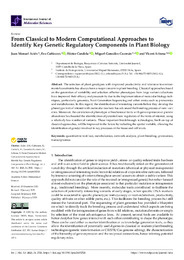Título :
From Classical to Modern Computational Approaches to Identify Key Genetic Regulatory Components in Plant Biology |
Autor :
Acién, Juan Manuel 
Cañizares Ramos, Eva 
Candela, Héctor
Gonzalez-Guzman, Miguel 
Arbona, Vicent  |
Editor :
MDPI |
Departamento:
Departamentos de la UMH::Biología Aplicada |
Fecha de publicación:
2023-01-28 |
URI :
https://hdl.handle.net/11000/35309 |
Resumen :
The selection of plant genotypes with improved productivity and tolerance to environmental constraints has always been a major concern in plant breeding. Classical approaches based
on the generation of variability and selection of better phenotypes from large variant collections
have improved their efficacy and processivity due to the implementation of molecular biology techniques, particularly genomics, Next Generation Sequencing and other omics such as proteomics
and metabolomics. In this regard, the identification of interesting variants before they develop the
phenotype trait of interest with molecular markers has advanced the breeding process of new varieties. Moreover, the correlation of phenotype or biochemical traits with gene expression or protein
abundance has boosted the identification of potential new regulators of the traits of interest, using
a relatively low number of variants. These important breakthrough technologies, built on top of
classical approaches, will be improved in the future by including the spatial variable, allowing the
identification of gene(s) involved in key processes at the tissue and cell levels.
|
Palabras clave/Materias:
quantitative trait loci
metabolomics
network analysis
plant breeding
proteomics
transcriptomics |
Área de conocimiento :
CDU: Ciencias puras y naturales: Biología |
Tipo de documento :
info:eu-repo/semantics/article |
Derechos de acceso:
info:eu-repo/semantics/openAccess
Attribution-NonCommercial-NoDerivatives 4.0 Internacional |
DOI :
https://doi.org/10.3390/ijms24032526 |
Publicado en:
International Journal of Molecular Science 2023, 24(3), 2526 |
Aparece en las colecciones:
Artículos - Biología Aplicada
|
 La licencia se describe como: Atribución-NonComercial-NoDerivada 4.0 Internacional.
La licencia se describe como: Atribución-NonComercial-NoDerivada 4.0 Internacional.
.png)
